Butter makes all the difference for 45-year-old thousand layer cake bakery in Jakarta
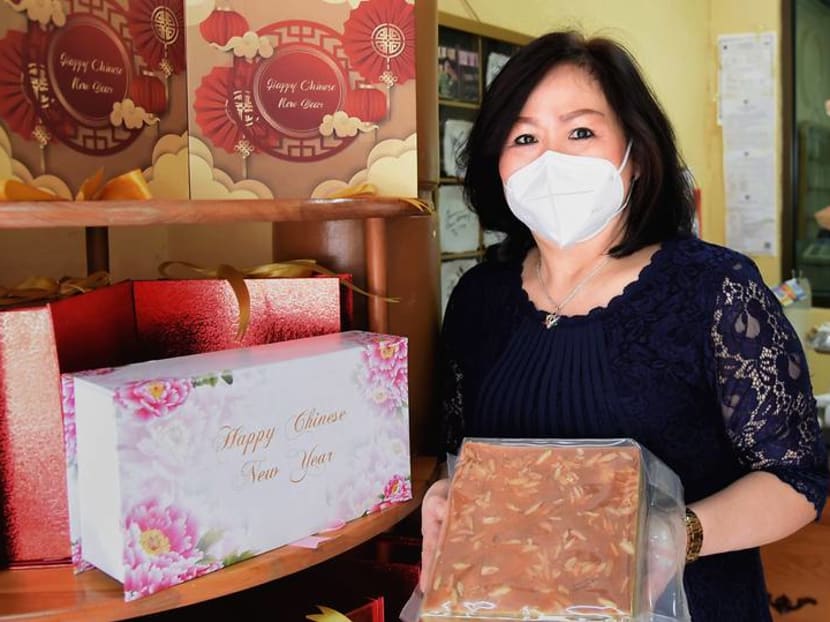
Liena Gusman is the second-generation owner of Happy Bakery, which specialises in kue lapis legit. (Photo: Kiki Siregar)
JAKARTA: Each layer of the kue lapis legit is believed by Indonesians of Chinese descent to symbolise fortune.
Also known as thousand layer cake, it comprises many thin layers piled on each other, made of butter, margarine, milk and egg.
To add flavour, cloves, cinnamon, and nutmeg are included, giving the cake a colour resembling bacon. Hence, during Indonesia's Dutch colonial period, the delicacy was known as Spekkoek (bacon cake).
While kue lapis legit is ubiquitous in Jakarta, the cake from Happy Bakery is among the most famous due to its taste, history and price.
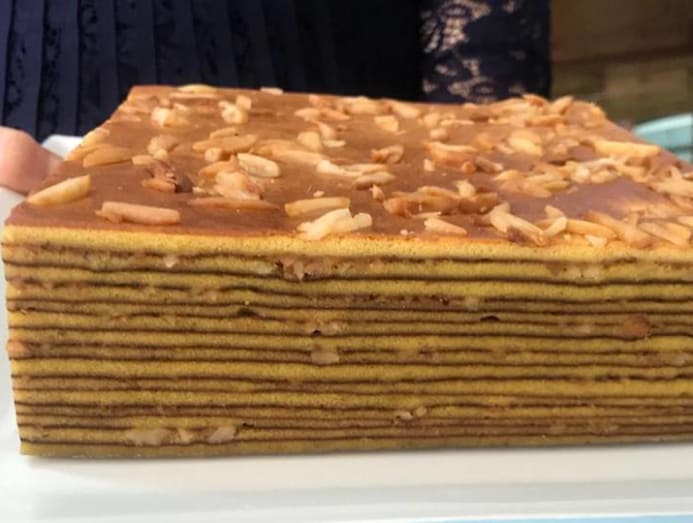
For 45 years, people have been patronising the bakery in South Jakarta when Chinese New Year approaches.
“It is a Chinese tradition here to buy it for the Chinese New Year,” owner Liena Gusman told CNA.
“The cake symbolises multiple fortunes, that is why it is sought after during Chinese New Year,” she added.
The 20cm x 20 cm cake is available in plain flavour, or with prunes, cheese and walnuts as toppings.
READ: A dash of honey: Jakarta's 'burnt' banana fritters a sought-after comfort food
It is the butter that distinguishes her cake from competitors, said Mdm Gusman, 60. “We use the finest butter, (imported) Dutch butter,” she said.
The more butter a variant has, the more expensive it becomes.
The cheapest variant, which only uses margarine, goes for 445,000 rupiah (US$31). Depending on the amount of butter used, it can cost up to 1,120,000 rupiah. The latter is often dubbed the most expensive kue lapis legit in town.
“The cake is hard to make. It takes about 2.5 to 3 hours,” Mdm Gusman said, adding that she does not use any preservative.
FROM RATTAN SELLER TO BAKER
Mdm Gusman is the second-generation owner of Happy Bakery.
Her father Gunaifi Lay, 88, was a struggling rattan seller in Palembang, South Sumatra who decided to take his family to Jakarta in 1969 in the hope of earning a better living.
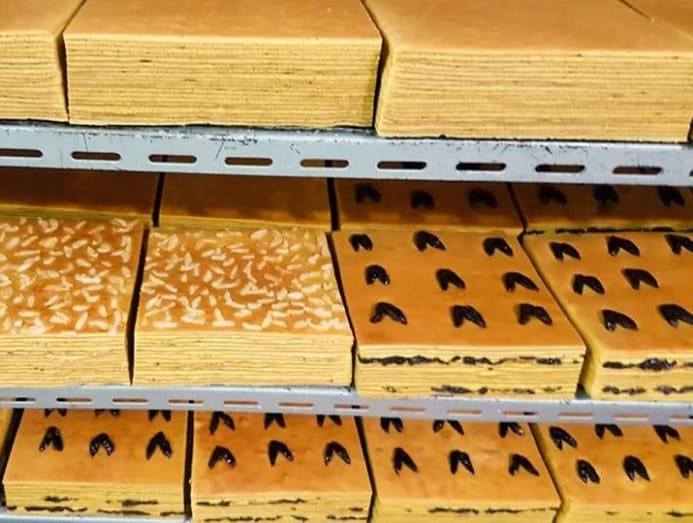
With only 300 rupiah, Mr Lay rented a room in Central Jakarta for his family of six and had only money left to buy some eggs.
His wife, an avid baker, made kue bolu (sponge cake) out of the eggs and Mr Lay decided to sell the cake.
Since Mr Lay was a stranger to Jakarta, he took the bus and sold it from one bus terminal to the other.
Over time, sales started to improve and a friend told him to make kue lapis legit as it was more sought after than sponge cake.
READ: Jakarta's 88-year-old ice cream parlour that stands the test of time
The move reaped dividends. Mr Lay later bought a house in South Jakarta for his family.
They continued to sell cakes to resellers. One day a man knocked on their door saying that smelled the aroma of their lapis legit and wanted to buy one.
That prompted Mr Lay to build a bakery in front of his house in 1976. Since cakes are meant for happy occasions, he named the bakery Happy.
They have never used a particular marketing strategy to promote their cakes and assumed their success was by word of mouth.
Apart from kue lapis legit, the bakery also sells the 3-layered lapis Surabaya, pineapple tarts, Dutch spekulas cookies and others.
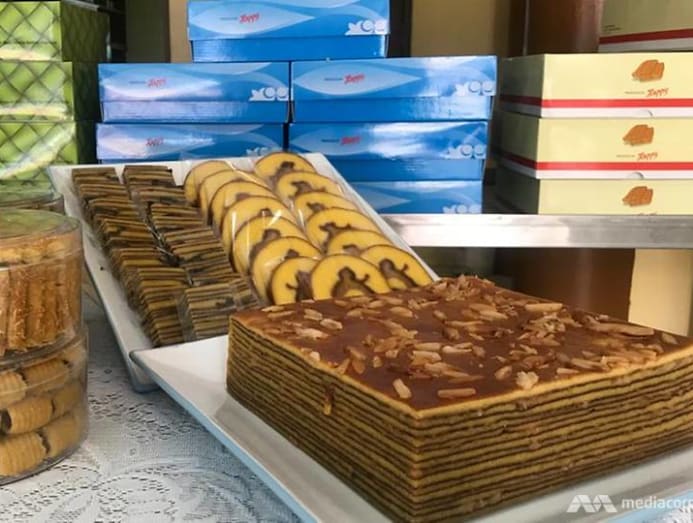
As the first child of four, Mdm Gusman had been helping her late mother with baking since she was just eight years old.
Coincidentally, she is also the only child who is interested in baking. Hence, when her parents decided to pass on the business 20 years ago, Mdm Gusman took over.
She remembers the heyday of the bakery to be during Indonesia’s second President Soeharto era when it was still a custom for people to give acquaintances cakes during festive days such as Chinese New Year and Hari Raya.
“I was baking cakes from 3am until 1am,” she reminisced. Their customers included members of Soeharto’s family and Indonesian celebrities.
STRONG DEMAND FROM FOREIGN VISITORS
After Soeharto’s fall in 1998, the business was still booming with customers from all over Indonesia and from abroad such as Malaysia, Singapore and even the Netherlands wanting to get hold of the traditional cake.
Most of the foreign customers are from Malaysia and Singapore, she said.
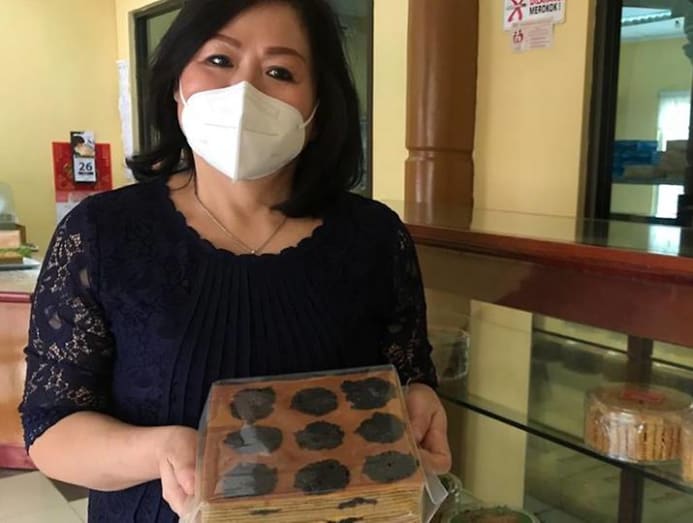
There were times when tourist buses arrived at the bakery and Malaysian customers wanted to buy their cake for takeaway. They were willing to wait for hours, she recalled.
She had many requests to export her cakes abroad but she always declined out of fear that the freshness would be compromised, as no preservatives are used.
Since Indonesia has been hit by COVID-19 last March, business has been poor, said Mdm Gusman.
“Now it is very bad. We are just breaking even.”
READ: Instant noodle obsession: 5 quirky twists to the classic Indomie in Jakarta
Before the pandemic, sales during Chinese New Year would increase tenfold. During the Hari Raya period, profit would be up 15 times as compared to the usual, she said.
However, sales were less than a quarter of the usual during last year's Hari Raya. She had to let go of about half of her 20 staff.
Even though this year’s Chinese New Year is predicted to be more subdued than usual due to COVID-19, Mdm Gusman hopes her loyal patrons will still buy her lapis legit.
“They usually buy the cake three days before Chinese New Year. So hopefully this year they will still come.”
Read this story in Bahasa Indonesia here.







